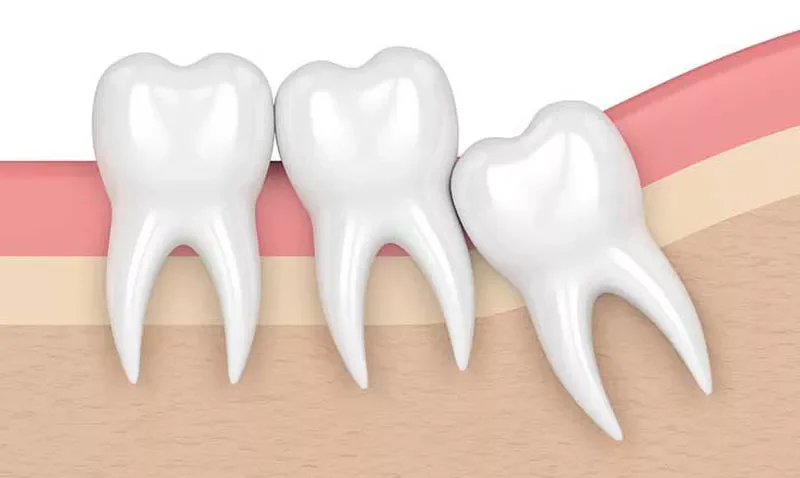Understanding The Need For Surgical Removal Of An Impacted Tooth

An impacted tooth is a tooth that doesn’t break through the gums and gets trapped in the jawbone. This usually happens when the teeth don’t have enough space to come out. Impacted teeth can lead to cavities, gum diseases, abscessed teeth, damage to your mandibular nerve etc. Hence understanding this dental condition is important to prevent these complications.
Dental impaction is of three types: soft tissue, complete bony and partial bony. Soft tissue impaction occurs when the tooth erupts through the jawbone but is still covered by the gums. Typically, a wisdom tooth is affected by soft tissue impaction. Partial bony impaction happens when a tooth is partially trapped within the jawbone, preventing it from fully erupting Here also, the wisdom tooth is mainly affected. Full bony impaction occurs when a tooth, often a wisdom tooth, is entirely enclosed within the jawbone and unable to erupt normally. Impacted tooth removal surgery is required in this case.
A surgical procedure is required to remove the impacted tooth. The patient will be given anesthesia to sleep and cut the gum tissue to take out some bone around the tooth. Hence the tooth can be removed safely.
Surgical Removal Of Wisdom Teeth In Kochi
There are several reasons you need to consider the surgical removal of an impacted tooth. Common reasons are:
- Discomfort or pain around your wisdom teeth
- Recurring infections in the soft tissue behind the lower molars
- Cysts are filled with fluid that may develop near wisdom teeth
- Potential harm to adjacent teeth
- Increased risk of gum disease
- Extensive tooth decay affecting the surrounding areas
You need to get rid of your wisdom tooth due to any of the above reasons.
Book your consultation today and take the first step towards a healthier smile!
Impacted tooth removal surgery is a procedure performed under anesthesia. The dental surgeon makes an incision in the gums and removes wisdom teeth. Then the operated area is cleaned and stitched. Gauze is applied to control bleeding and post-care instructions are given for recovery.
What to Expect After Wisdom Teeth Removal?
After impacted tooth removal surgery, swelling, pain and numbness in the mouth can be experienced. One or two days rest is recommended as part of surgery aftercare. These irritations will continue for around one week and then subside. After one week the pain in your mouth decreases and you can return to your normal life. If there were any complications with the surgery, the recovery period may last up to two weeks.
Self-care is very important after surgery. During the first 24 hours avoid alcohol, tobacco products, chewing food, rinsing and spitting, smoking and hot drinks. Also avoid strenuous exercise, smoking and consuming hard food until you recover completely.
FAQ
Yes, you may be able to avoid surgery if your impacted tooth isn’t causing pain or other complications, but it still requires monitoring. Some impacted teeth can remain symptom-free yet pose future risks like infection, crowding, or damage to nearby teeth. It’s best to consult a dentist for proper evaluation and guidance on impacted tooth treatment.
Yes, swelling and bruising are normal after oral surgery, especially within the first 2–3 days. These are natural parts of the healing process and typically subside within a week. Applying ice packs, following post-operative instructions, and taking prescribed medications can help manage discomfort and speed up recovery.
Yes, impacted teeth especially wisdom teeth can cause headaches, earaches, or even sinus pressure and pain. This happens due to the pressure they exert on surrounding structures or from infections they may cause. Early evaluation and impacted tooth treatment can help prevent or relieve these associated symptoms.
You should wait at least 24 to 48 hours before eating solid foods after surgical tooth removal. Start with soft foods like yogurt, soup, or mashed potatoes, and gradually reintroduce solids as healing progresses and discomfort decreases. Always follow your dentist’s instructions to avoid disturbing the surgical site.
Yes, there is a small risk of bone loss after impacted tooth removal, especially if the tooth was deeply embedded or if healing is delayed. However, proper impacted tooth treatment and post-surgical care can minimize this risk and support healthy bone regeneration.

